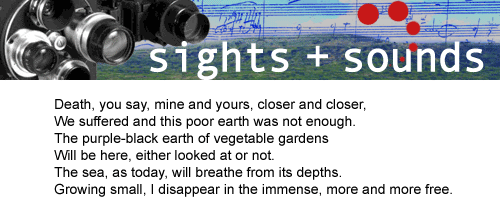|
|
 |
Czeslaw Milosz, 1911-2004
Poland's Nobel Prize-winning emigre poet, Czeslaw Milosz, died Saturday at his home in the southern Polish city of Krakow at the age of 93, Polish media reported.
Long a symbol of opposition to totalitarianism, he received the 1980 Nobel Literary Prize for his lifelong poetic achievements amid the heady atmosphere of the Polish Solidarity movement's bold challenge to Soviet-style communist rule.
Initially a supporter of Poland's Soviet-imposed post-war regime, he served in its diplomatic corps from 1945 to 1950 before becoming disillusioned with communism and defecting in 1951.
He made his home in France before moving to the United States in 1960 where he taught literature at the University of California in Berkeley, wrote poetry and translated English literature into Polish.
In the 1990s, after Poland's largely peaceful revolution from communism to democracy he returned to Poland and settled in Krakow.
(Source: Reuters)
|
|
Folkstreams
The mission of Folkstreams.net is to build a national preserve of documentary films about American folk or roots culture. Produced by independent filmmakers, these hard-to-find films give voice to the arts and experience of diverse American groups. Folkstreams.net makes these films easy to find and to see by video-streaming them on the Internet, and also provides in-depth and reliable contextual materials about the subjects and the filmmaking.
|
|
SampleSwap Audio
SampleSwap is a free site dedicated to enabling electronic musicians world wide to share their original sounds and music. SampleSwap is made up of 7000+ members who've been swapping free samples since 1998. Until recently you needed to download an obscure piece of software called Hotline to take advantage of the collection, but now everything can be done with your web browser. You can browse lo-fi mp3's of all the samples and read what people are saying in the bulletin boards while exploring the collection.
|
|
Flicker Films
Flicker is a completely non-commercial, grass-roots entity perpetuated by Super-8 filmmakers and filmgoers, who developed an international series of film festivals beginning in Athens, GA in the late 1980's. Their website was created to catalog some of the many memorable films that have graced the Flicker screens over the years.
|
|
Mutopia Project
The Mutopia Project operates on principles similar to Project Gutenberg, but consists of free sheet music. Broadly speaking, copyright on a creative work expires 70 years after the creator's death. The idea behind the Mutopia Project is that volunteers typeset public domain editions of sheet music using the GNU Lilypond typesetting software, and make them freely available. The works may be freely downloaded, printed, copied, distributed, modified, performed or recorded. All music is available as Postscript (.ps) and PDF (.pdf) files, as well as Lilypond's own file format (.ly). Audio previews of the music are available as MIDI (.mid) files; these are computer generated but give a rough idea of what the music sounds like.
|
|
Open Video Project
The purpose of the Open Video Project is to collect and make available a repository of digitized video content for the digital video, multimedia retrieval, digital library, and other research communities. Researchers can use the video to study a wide range of problems, such as tests of algorithms for automatic segmentation, summarization, and creation of surrogates that describe video content; the development of face recognition algorithms; or creating and evaluating interfaces that display result sets from multimedia queries. The repository provides video clips from a variety of sources, especially video programs obtained from U.S. government agencies such as the U.S. Records and Archives Administration and NASA. The Open Video Project is at the Interaction Design Laboratory at the School of Information and Library Science, University of North Carolina Chapel Hill.
|
|
The newkular family electronic media library
The newkular family electronic media library is a catalyst for electronic media development and circulation. Through their electronic media library and community efforts, they seek to expose digital film, video art, audio narrative and documentary, and electronic music to a broader audience. The newkular family electronic media library provides a forum in which amateur producers can share their digital video and electronic music work. The video archives are limited to non-professional work to provide an atmosphere that encourages newcomers to venture into artistic frontiers. The musical collection includes the original production work of amateur electronic musicians, as well as DJ performances of house, electro, drum 'n' bass, hip-hop, techno, and other styles of electronic music.
|
|
|
|